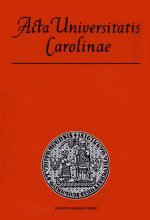Charakter a podstata státní správy za principátu
The Nature and Substance of State Administration During the Principate
Author(s): Michal SkřejpekSubject(s): Law, Constitution, Jurisprudence
Published by: Univerzita Karlova v Praze, Nakladatelství Karolinum
Summary/Abstract: State administration at the first stage of the development of the Roman Empire – the principate – shows many specific features and may be designated as a dual-hybrid administrative model. Its dualism was expressed in several forms. First, it was a personal relationship between members of the Senate Aristocracy, holding old, but still continuing republican offices, and members of the Roman cavalry (equites) holding the new imperial offices. In addition, two branches of state administration existed simultaneously. One branch was represented by the original republican offices (magistrates) whose importance was gradually declining. The other was composed of newly established imperial offices including curatores, legati Augusti, procuratores and praefecti. These officers created four types of empire authorities: local government, financial offices, prefect’s offices and the imperial court’s offices. The substance of the hybrid form of imperial administration subsists in several aspects. This is not only the use of former patterns for the construction of the imperial administration (such as prefect’s offices) but also the use of institutions originating in private law (curatores and procuratores as designated representatives of the Emperor for a particular branch of state administration; the consultative body of the head of Roman patriarchal family as a predecessor of the imperial council – consilium principis). However, what is primarily meant is that imperial offices, even the highest and most powerful offices, were governed by two categories of persons. These were members of the lower nobility (equites) as well as members of familia Caesaris (Emperor’s slaves and released former slaves). The influence of the latter category was gradually declining but in the 2nd century A.D. equites heads of the imperial court’s offices had an officer of ex-slave origin assigned (proximus) who represented this category.
Journal: Acta Universitatis Carolinae Iuridica
- Issue Year: 56/2010
- Issue No: 1
- Page Range: 13-21
- Page Count: 9
- Language: Czech

